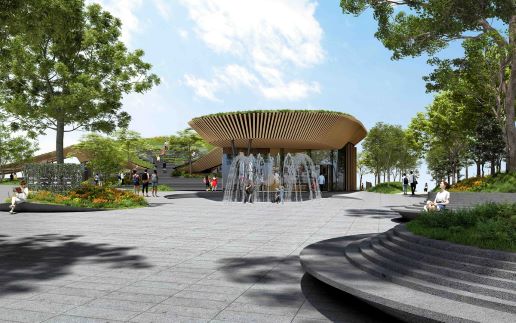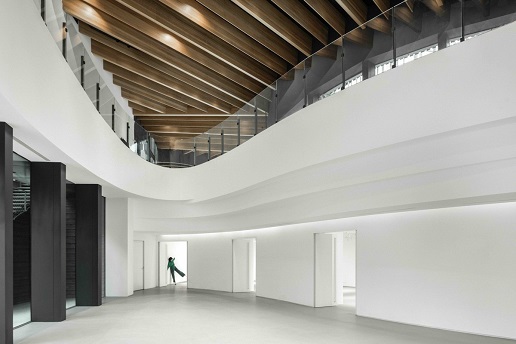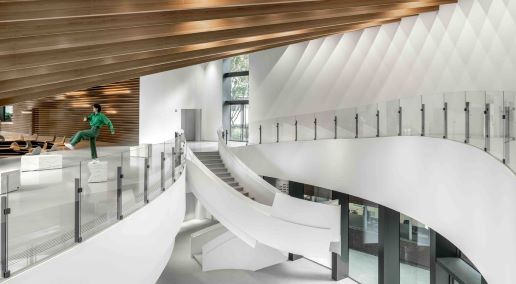The "Qin Art Museum" located in the Qinmei Caowu Living District in Taichung will officially open on December 13, 2024. After more than ten years of trial and transformation, and six years of construction projects, this landscape-style building integrated into the neighborhood has been completed. , also became Kengo Kuma’s first art museum work in Taiwan.
A temporary art museum that originated more than ten years ago
Looking back on the transformation of the Qin Art Museum over the past ten years, in 2012, the "Qin Art Museum" was transformed from an idle elementary school into a temporary art museum that combined outdoor public exhibition areas and broke the boundaries of traditional exhibitions; in 2019, the "Gongjia Art Museum" challenged Taiwan's common The construction site was built into a public works art gallery, successfully transcending spatial barriers and turning the construction site into a cultural site where people can live, communicate, and learn and experience freely; the 2020 "Satoyama Ichiji Public Art" project truly presents the world through design and art. Come into life and shape Cao Wudao's unique creative life outlook.
Over the years, these projects have connected design and people, people and neighborhoods, and people and life, exerting social influence and accumulating energy to become the new generation of Qin Art Museum that is about to open. In the future, this international landscape art museum will become a long-term base, adhering to the principle that "imagination is the foundation of all innovation", embracing the curatorial spirit of "popular themes, niche interpretation; niche themes, mass interpretation" to carry out cultural curation, CaoWudao issue planning, children's education, lifestyle selection and catering and other diversified business models.
Nature-based landscape architecture designed by Kengo Kuma’s team
The new generation Qin Art Museum takes "an emerging art environment that combines greenery, creativity, inspiration and inspires imagination" as its business positioning and hardware facilities. It is designed by Kengo Kuma's architectural team, inheriting the previous brand characteristics and taking into account The Qinmei Caowu Living Circle, where the art museum is located, takes the entire landscape and environmental scale into consideration, giving the venue a thin and light visual appearance as if "opening up the earth", and using the "Tangcao" pattern as the design inspiration to create a transparent The complex and varied use of curly arcs encircles the building from the outside in, as well as the surrounding curved forest paths, paddling pools and other interactive circulation lines, allowing the Qin Art Museum to integrate the neighborhood, nature and art into a high-rise building and grass enlightenment. An urban oasis among the forests. Kengo Kuma's architectural team has imbued the building with a thin, translucent image, as if "lifting the earth" (Photo / Cingmei Art Museum)
Kengo Kuma's architectural team has imbued the building with a thin, translucent image, as if "lifting the earth" (Photo / Cingmei Art Museum)
The building covers one floor above ground and one underground floor. It adopts a steel structure, which is more flexible and lighter than traditional reinforced concrete construction methods and can also reduce carbon emissions. The 410-square-meter green roof is developed based on a stable door-shaped structure and is slowly expanded. Out of the curvature of the curved surface, countless small triangular steel plates are connected in series to form one point after another. The particles are stacked into three-dimensional lines and surfaces, forming a natural and smooth twisting angle like hills.
The connection between the roof and the land is smoothly transformed into a staircase, replacing the abrupt inward arc and the conflicting feeling of the steel end turning, making it naturally become a part of the landscape; in addition, a green roof is also built The water circulation system is used for the sustainable growth and maintenance of plants, and also allows visitors to step on the grass to rest and enjoy the different urban ecological scenery.
In order to echo the green texture of Caowu Road, Kengo Kuma's architectural team also used nearly 1,282 wood grain grilles of various shapes on the exterior of the building to deepen the warm temperament of Qin Art Museum, and used large-area floor-to-ceiling windows to create a penetrating space that extends The vision of the internal and external landscape makes the field of vision wider. Various design details allow Qin Art Museum to be naturally hidden in a green environment. Its unobtrusive image echoes the life of the neighborhood.
An indoor exhibition experience like a mountain adventure
Compared with outdoor design that focuses on the connection between architecture and the environment, interior design pays more attention to the interaction between people and space. Continuing the rhythmic undulations consistent with the exterior, Kengo Kuma's architectural team simulated the natural scene with wooden grilles, slate walls, and undulating floors, plus dancing beams on the ceiling, making walking indoors feel like a mountain adventure. When viewing the exhibition, you can not only focus on the works in front of you, but also follow the terrain to enhance the visual effect and extend the three-dimensional and layered vision in the distance.  The interior design focuses on the interactive relationship between people and space, using building materials and varied elevations to simulate natural landscapes (Photo / Cingmei Art Museum)
The interior design focuses on the interactive relationship between people and space, using building materials and varied elevations to simulate natural landscapes (Photo / Cingmei Art Museum)
Passing through the revolving reception desk, passing through the sky bridge gallery, spiral staircase, and underground exhibition hall, Tangcao design lines are also used in the space, drawing out new visual ideas between horizontal and vertical levels. The architectural team used neat and delicate beveled corners to deliberately reveal the lines of the building materials, layer by layer to create a spatial texture with varying depths. The wooden grilles surrounding the space also reflect different flows of light and shadow as the day and night change. , bring richer imagination.
With the arrival of public facilities, the opening of the first exhibition, cultural and educational promotion and other activities, the Qin Art Museum will officially transform into an imaginative and inspiring place in the neighborhood, using multiple functions to lead everyone into in-depth artistic exploration.
Qin Art Museum CMP INSPIRATION
Address | No. 79, Guanqian Road, West District, Taichung City 403
Phone|04-2328-5000







